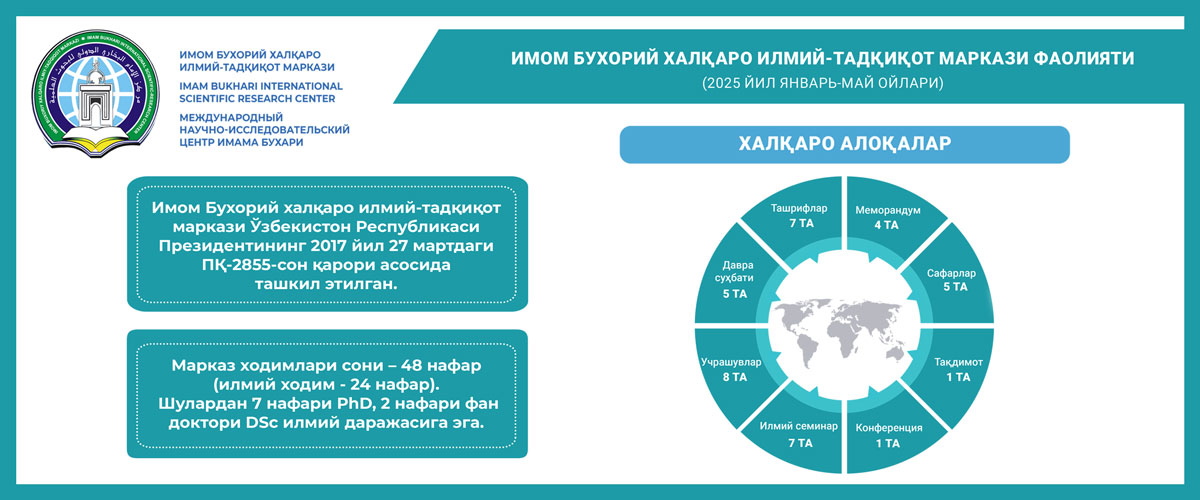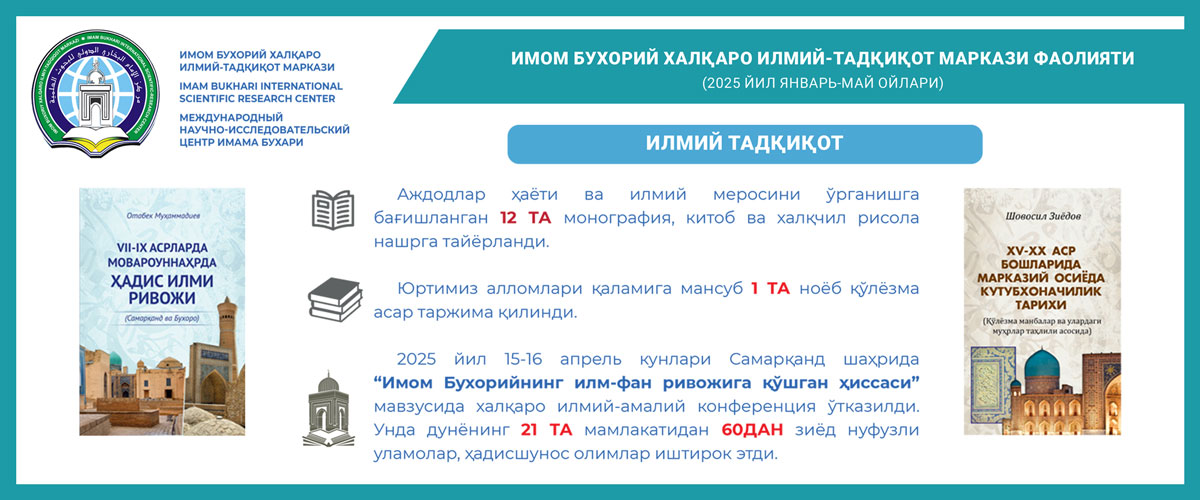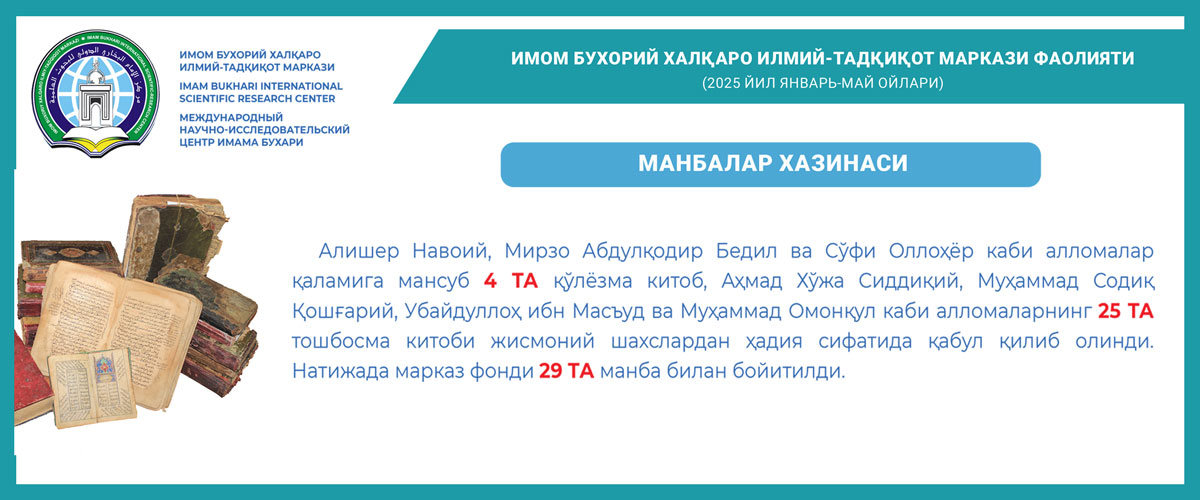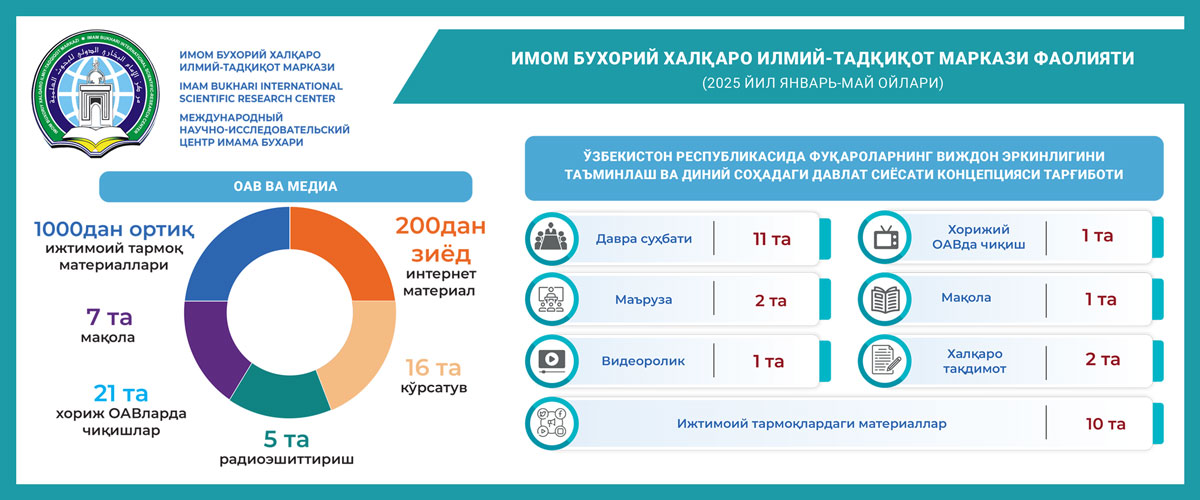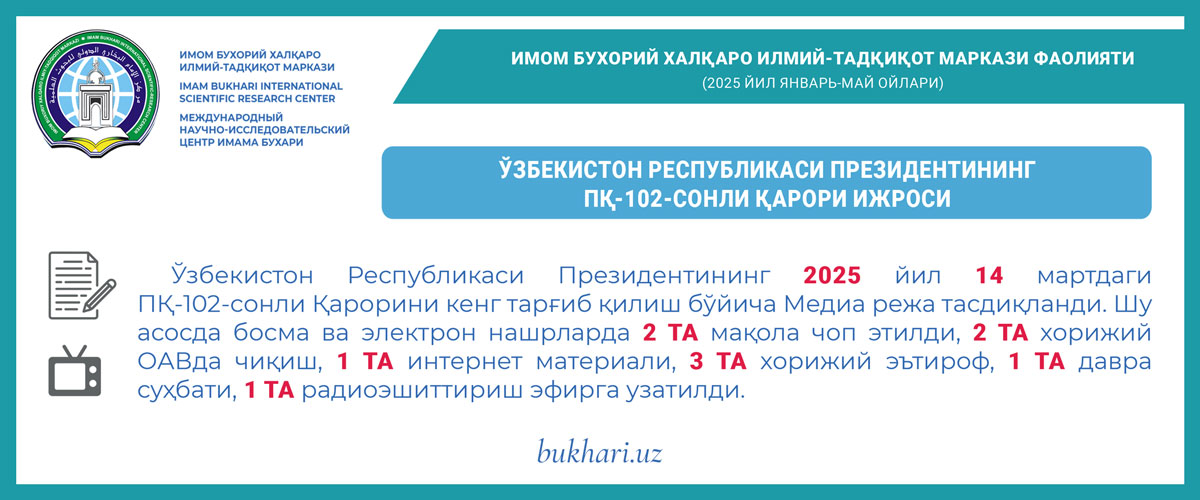Our country has been inhabited since ancient times by different peoples with different cultures, languages, customs, lifestyle, different religions and similarities.
As the head of our state Sh. Mirziyoyev said: “We value our sacred religion as an expression of our eternal values. We strongly condemn those who equate our sacred religion with violence and bloodshed, and we can never reconcile with them. Islam calls us to goodness and peace, to preserve true human qualities.”[1].
Since the first years of independence, our country has been paying special attention to preserving the values of various religions, creating the necessary conditions for all citizens to profess their faith, further strengthening interreligious and interethnic harmony, and developing ancient common traditions. The Constitution of the Republic of Uzbekistan provides that “All citizens of the Republic of Uzbekistan shall have equal rights and freedoms, and shall be equal before the law, without discrimination by sex, race, nationality, language, religion, social origin, convictions, individual and social status.” And this is the ground created to further strengthen solidarity.
In our country, all the legal foundations and the necessary conditions have been created to ensure interethnic and interfaith harmony. The formation and further strengthening of the culture of tolerance has become one of the priorities of our state policy. The ultimate goal of tolerance is to encourage humanity to maintain peace and tranquility.
Today Uzbekistan is a model for the world in terms of religious tolerance and interreligious dialogue. Citizens living in our country, regardless of their religion, work together for the sake of peace and tranquility, for the development of our country. In our country, the legal framework for freedom of conscience is being improved. Today in Uzbekistan all conditions have been created for people of different religions to practice their religion without any obstacles.
It is known from history that in a society where the principles of religious tolerance are reflected, mutual respect and sincerity will be established, and all people live in peace and tranquility. Just as there can be no progress and prosperity without peace, so the peace cannot be stable without religious tolerance. That is why humanity from the very beginning of life on Earth felt the need to live according to the principles of tolerance.
Since ancient times, Central Asia, in particular the territory of Uzbekistan, has been a country inhabited by several different peoples with different cultures, languages, customs, lifestyles, beliefs in different religions. The geographical position of Uzbekistan at the crossroads of important trade routes and economic ties with many countries have had a significant impact on the religious and spiritual life of the indigenous peoples, as well as on the traditions of Maworaunnahr and the development of other cultures. This served as one of the key factors in the formation of interethnic solidarity and religious tolerance.
Indeed, on the land of Uzbekistan since ancient times, along with Islam, representatives of other religions lived and developed side by side and made a significant contribution to the spiritual development of this society.
Such examples of religious tolerance can be seen in the life of our great ancestors who lived in our country. The army of the great commander Amir Temur also included Jews and soldiers of other religions. Miranshah, son of Sahibkiran, was made responsible for diplomatic relations with countries such as France, Spain and England. The people of India still remember with respect Zahiruddin Muhammad Babur and his descendants. The reason was that the Baburids ruled the state on the basis of religious tolerance.
In our sacred religion of Islam, the concept of tolerance means “mercy” in a religious sense, in the broadest sense it means kindness to beauty in the face of disgusting things and events and a wonderful approach to any reality, respect, faith, culture and tradition[2].
Like other religions, Islam has taught and teaches humanity for a long time to be kind, to treat its believers, even adherents of a different faith (people professing a religion other than Islam), with respect and tolerance. He not only respected the heavenly religions that preceded him (Judaism, Christianity), but also showed infinite mercy to the representatives of this religion. Their rights are enshrined in Sharia law. Respected their culture and traditions. Muslims who have lived by these rules for centuries have shown unprecedented examples of mercy towards each other and even towards the non-Muslims living among them, as well as to Ahl al-Zimma (non-Muslims living in the shadow of the Islamic State). Because it was the command of Allah and the indication of His Messenger to the ummah.
The Prophet (peace and blessings of Allaah be upon him) said: “Whoever harms his people will see me as his enemy on the Day of Resurrection.” Remembering this hadith, Hadrat ‘Umar (may Allah be pleased with him) sent Amr ibn’ Asa (may Allah be pleased with him) to conquer Egypt: “Be careful! Do not make the Messenger of Allah (peace and blessings of Allah be upon him) your enemy.”[3]
The Quran calls for the recognition of the sacred books that preceded it – the Psalms, the Torah, the Bible, and for the respect of the People of the Book, that is, representatives of other religions. He encourages people to love each other, to cooperate, and to overcome all forms of discord, disagreement and conflict. There are many examples from the history of our sacred religion that can serve as examples of high tolerance. In particular, several pages from the Torah were among the spoils of war for Muslims in Khaybar. The Jews came to the Messenger of Allah and asked to return those pages. Our Prophet ordered to return them to the Jews. After all, respect for the values of other religions is one of the great moral standards of Islam. Therefore, the pages that were considered sacred to the Jews were returned to them without the slightest damage. These events are a prime example of religious tolerance in Islam.
Another truth that the Qur’an has taught us is that we should treat the places of worship of other religions, such as Christians and Jews, with deep respect and reverence.
After the Prophet moved to Medina, they entered into an agreement with local Jews, established the principles of coexistence for the sake of peace and the interests of society, and lived in obedience to them.
Muhammad (peace and blessings of Allaah be upon him) had good personal relationships with representatives of other religions and treated them well. In particular, they gave them gifts and accepted gifts given to them. For example, it is known in history that the Prophet (peace and blessings of Allaah be upon him) wore clothes donated by members of other religions.
The Prophet (peace and blessings of Allaah be upon him) allowed Christian guests from Abyssinia to enter his mosques and personally served them saying: “They respected our hosts. I like to honor them myself. ” He (peace and blessings of Allaah be upon him) also allowed a group of Christians from Najran into his mosques and allowed them to pray there.
The idea of interreligious tolerance implies cooperation not only of believers, but also of all members of society for the good of the cause and is an important condition for peace and stability. The fact that mosques, churches and synagogues in large cities of the country have always freely served their parishioners and that no religious conflicts have arisen even in the most difficult moments of our history testifies to the great experience of our people in inter-religious tolerance. That is why the world community recognizes that Uzbekistan adheres to high traditions of religious tolerance.
One of the members of the Jewish community R. Beneman said that the first synagogue in Bukhara was built in the 8th century, and that along with other religions, sufficient conditions were created for the free practice of their religion and stressed: “Judaism, persecuted in medieval Europe and the Byzantine Empire, had the same rights as other religions in Central Asia. “
The representatives of the nation and people sincerely recognize the tolerance of the Uzbek people and their respect for various confessions and cultures.
Currently, more than 130 nationalities, 16 religious confessions and more than 2,200 religious organizations in our country live in peace and harmony, adhering to the principles of religious tolerance.
Thus, from the above it is clear that human qualities are manifested in the development of society, peace and tranquility, mutual compassion in the name of peace and harmony, respect for elders, respect for children, respect for the rights of kinship and good neighborliness, tolerance for other religions.
Indeed, interethnic harmony, religious tolerance and solidarity are one of the main criteria for the development of civil society, and these principles are the key to development and peace in our country.
 Imom Buxoriy xalqaro ilmiy-tadqiqot markazi bukhari.uz
Imom Buxoriy xalqaro ilmiy-tadqiqot markazi bukhari.uz
